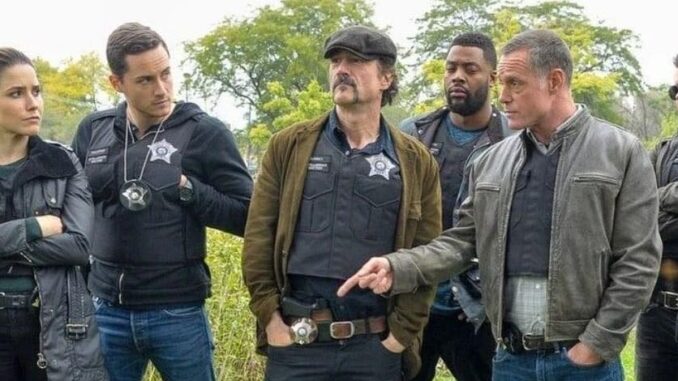
Jason Beghe didn’t set out to become one of the most commanding presences on television. Born in New York City in 1960, he attended the prestigious Collegiate School alongside future stars like John F. Kennedy Jr. and actor David Duchovny.
In fact, it was Beghe who reportedly encouraged Duchovny to consider acting — a path both would eventually take to great success.
Beghe’s career started in the late 1980s with roles in television and film. You may recognize him from the George A. Romero film Monkey Shines or his appearances in shows like Melrose Place, Chicago Hope, and Everwood. But despite his talent and versatility, he remained under the radar for decades — that is, until Chicago P.D. came calling.
The Voice, the Presence — and the Pain Behind It
One of Jason Beghe’s most distinctive features is his voice: raspy, almost broken, and utterly unique. But that voice isn’t a theatrical choice — it’s the result of real-life trauma.
In the late 1990s, Beghe was involved in a serious car accident that left him with a crushed throat and led to permanent damage to his vocal cords. The result? The deep, gritty tone that has since become his signature on-screen.
While many actors might have considered this a setback, Beghe leaned into it. Rather than hide the injury, he used it to bring authenticity to his characters — none more so than Voight. That voice is not only unforgettable — it’s earned.
And it’s part of what makes Voight so believable: he sounds like someone who has lived through pain, who’s buried too many friends, and who has made too many impossible choices.
Voight and Beghe: More Alike Than You’d Think
Hank Voight is a complicated figure. He’s a man who often operates in moral gray zones — sometimes bending the law, sometimes breaking it, but always acting with what he believes is righteous intent. He’s feared, respected, and deeply misunderstood.
What makes Beghe’s portrayal so powerful is the emotional complexity he brings to the role. Voight is never one-dimensional. He’s not just a tough guy. He’s a grieving father, a broken man, a leader trying to protect his team in a corrupt world.
Much of that nuance comes from Jason Beghe’s own life experience.
He has been open about his personal struggles, including his public and painful departure from the Church of Scientology. After decades as a member — and even serving as a celebrity spokesperson — Beghe left the organization in the mid-2000s and became one of its most outspoken critics. His exit was not without consequences, but it marked a major turning point in his life.
This personal journey — of questioning authority, seeking truth, and standing alone — mirrors the inner conflict of Voight. It’s no wonder that fans often feel Beghe isn’t just playing Voight — he is Voight.
A Leader On and Off Screen
Just like Voight commands respect within the Intelligence Unit, Jason Beghe is a central figure on the Chicago P.D. set. Cast members have repeatedly praised his leadership, his commitment to craft, and his deep investment in telling meaningful stories.
He brings intensity to every scene but also offers support and encouragement to his co-stars, especially those navigating emotionally heavy material. Behind the camera, he’s known for asking difficult questions, pushing for authenticity, and making sure the human element is never lost — no matter how action-packed the episode is.
This has helped shape Chicago P.D. into more than a procedural. It’s a character drama that explores justice, morality, grief, and loyalty. And Beghe’s fingerprints are all over it.
Beyond the Badge: Family, Reflection, and Purpose
Outside of acting, Beghe keeps a relatively low profile. He’s a father, a thinker, and someone who has publicly acknowledged his past mistakes and sought to grow from them.
In interviews, he’s refreshingly candid. He’s not interested in playing the Hollywood game. He speaks honestly about pain, recovery, and personal transformation. And in a world of polished public images, that raw honesty makes him — and Voight — stand out even more.
He’s a man who’s lived a full life. And he brings every bit of that experience into his performances.
Why Jason Beghe Matters
In an industry often obsessed with reinvention, Jason Beghe has done something rare — he’s found success not by changing who he is, but by embracing it. He doesn’t just play a tough cop. He understands the human cost behind every choice that cop makes.
His voice isn’t just gravelly. It’s a reminder of survival. His presence isn’t just intimidating. It’s earned.
And his portrayal of Hank Voight isn’t just compelling — it’s unforgettable.
Because in the end, Beghe’s real-life resilience is what gives Voight his soul. And it’s why fans don’t just watch Chicago P.D. for the action — they watch for the man who leads the team, limps through his regrets, and fights like hell for justice in a world that rarely offers it cleanly.
